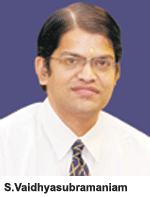There’s considerable nervous tension in the air of 20 engineering colleges spread across Tamil Nadu, Andhra Pradesh, Karnataka and Kerala. The managements of these colleges are preparing for a trial accreditation process this month (September) in which the quality of their syllabuses/curriculums will be rigorously assessed. These 20 colleges have been selected by a special task force constituted by the National Board of Accreditation (NBA) — a subsidiary of the Delhi-based All India Council for Technical Education (AICTE). The outcome of the assessment will determine whether the study programmes offered by the country’s engineering colleges satisfy global quality norms and conditions to qualify India to become a fully-fledged member of the Washington Accord in 2011.
The Washington Accord (estb. 1989) is an international agreement between accreditation agencies responsible for assessing and grading undergraduate engineering degree programmes in signatory countries. It acknowledges the substantial equivalency of programmes accredited by member country agencies and recommends that graduates of colleges/programmes accredited by authorised agencies be deemed to have met the academic requirements for practice of engineering in all member countries. Membership of the Accord will improve global mobility of Indian engineering graduates who will be able to pursue further studies in all signatory countries, and will also enable credit transfers between institutions.
There are 13 permanent members of the Accord including Australia, Canada, New Zealand, Singapore, South Africa, United Kingdom and the United States. Currently, India is a provisional member of the Accord as two earlier attempts in 2007 and 2009 to become a permanent member were rejected. Since then NBA has reportedly tightened its accreditation norms and processes, and India is making a last-ditch attempt to attain permanent membership in 2011 when its provisional status, which has already been extended twice, is due to expire.
Inevitably, the NBA is banking heavily on engineering colleges in Tamil Nadu, Andhra Pradesh, Kerala and Karnataka — which together account for over 1,500 engineering colleges churning out 450,000 graduates every year — to gain entry into the Accord. The state of Tamil Nadu (pop. 62 million) in particular, prides itself on being a leader in engineering education and boasts 498 engineering colleges which produce 150,000 graduates every year.
“The Accord specifies that engineering students should have the ability to apply theoretical knowledge to solve real-life problems; capability to function in multi-disciplinary environments; possess requisite English communication skills; and engage in lifelong learning among other require-ments. Unless our colleges upgrade their programmes to meet these specific-ations, it will be difficult to be admitted as a member-nation of the Accord,” says S.R.K. Prasad, correspondent of the Coimbatore Institute of Technology and one of the six members of the NBA task force.
 Monitors of higher education are not optimistic about India’s chances of being admitted into the Washington Accord because several studies have highlighted the poor quality of graduates churned out by India’s 2,500 engineering colleges. A National Employability Study IT/ITeS conducted by assessment company Aspiring Minds in 2010 indicates that only 4.22 percent of India’s 800,000 engineers are employable in IT product companies and a mere 17.84 percent are employable in IT services companies. Around 62 percent of Indian engine-ering graduates need some form of additional training to land jobs in these industries.
Monitors of higher education are not optimistic about India’s chances of being admitted into the Washington Accord because several studies have highlighted the poor quality of graduates churned out by India’s 2,500 engineering colleges. A National Employability Study IT/ITeS conducted by assessment company Aspiring Minds in 2010 indicates that only 4.22 percent of India’s 800,000 engineers are employable in IT product companies and a mere 17.84 percent are employable in IT services companies. Around 62 percent of Indian engine-ering graduates need some form of additional training to land jobs in these industries.
“The quality gap between Indian engineering education programmes and those offered by other signatory countries is huge and ever widening. The plain truth is our engineering colleges are mere teaching shops whereas Western colleges are research-oriented and offer hands-on training. Moreover, most of our colleges are experiencing a faculty shortage — estimated at 67 percent — and this crisis is compounded by proliferation of engineering institutions in southern India even as the number of students signing up for engineering education is increasing continuously. The consequence is very skewed teacher-pupil ratios,” says S.Vaidhyasubramaniam, dean, planning and development of SASTRA University, Thanjavur.
Even as the 20 selected engineering colleges in peninsular India get ready for the trial accreditation process, the NBA task force is chalking up a roadmap to take the evaluation process forward step by step. Whether India finally enters the Washington Accord or not, the results of the trial accreditation process will clearly indicate where some of the best engineering colleges in southern India stand in terms of world-class engineering education.
Hemalatha Raghupathi (Chennai)